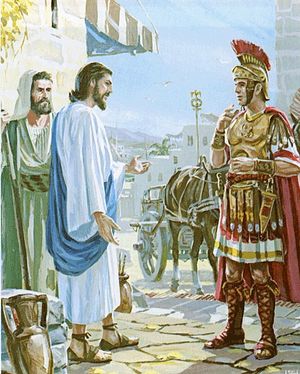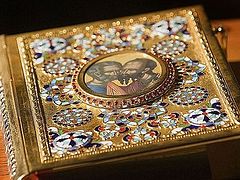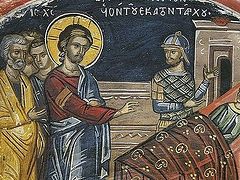The Gospel of the Centurion with the sick servant in Matthew 8:5-13 presents us with a man who has a need or a problem which he cannot resolve by himself. Even though he is a Roman centurion, a commanding officer in a Roman legion, he has come to recognize the limits of his powers – he cannot heal his servant nor command anyone, not even a doctor to heal his servant. He doesn’t have that kind of power within his command. He is in Israel as part of the conquering Roman army, an army that no doubt gave the impression of invincibility to many. Yet, the Centurion who could do many things as a commanding officer and as part of the powerful Roman army, and who has all the power to order his men to do his bidding, still faced his own powerlessness when it came to bring health to his servant. He apparently cared a great deal about this servant. All the military might of the Roman Empire could not heal the servant, nor could all the gods of the polytheistic Empire. So the Centurion was in need feeling helpless, and it was this need which caused him to pay attention to the claimed Messiah of the conquered and subjugated Jewish people. He apparently had heard that Jesus did have the power to heal, and so in his own impotence, he came begging to Christ to make up the power which he was personally lacking. He was feeling the limits of his power, but he understood command.
I believe it was Metropolitan Anthony Bloom who said, “God can save the sinner that you are, not the saint that you pretend to be.”
We approach Christ in our need, not in our strength. The centurion was able to be honest about his limits and failures; he understood pretending could never create reality.
Metropolitan Anthony’s aphorism has to be thought of with what Jesus said,“Those who are well have no need of a physician, but those who are sick; I have not come to call the righteous, but sinners to repentance” (Mark 2:17).
It is only when we are completely honest about ourselves, and can admit to our faults and our sins that we come to see why we need Christ in our lives. If we want to pretend that we aren’t really sinners, then of course we see no need for Christ to call us, let alone save us.
Like the Centurion we have to recognize our own powerlessness over certain aspects of our lives. It is not possible for us to be sinless and perfectly holy on our own. We can try to be or even pretend to be perfect in terms of following Tradition, or rubrics and rituals, or in morality or dogma. We will still find ourselves in need of God’s mercies and love. Without His love, our moral or ritual or dogmatic perfection are nothing, as St. Paul writes In 1 Corinthians 13:1-3 –
If I speak in the tongues of men and of angels, but have not love, I am a noisy gong or a clanging cymbal. And if I have prophetic powers, and understand all mysteries and all knowledge, and if I have all faith, so as to remove mountains, but have not love, I am nothing. If I give away all I have, and if I deliver my body to be burned, but have not love, I gain nothing.
If I realize I don’t have that love, I realize my need, just like the Centurion. I need Christ in my life. Alone, I don’t have even the resources of the Centurion, and I know I cannot accomplish all that I wish in life.
The singer William Bell has a song, “The Three of Me” which begins with these words:
Last night I had a dream
And there were three of me
There was the man I was the man I am
And the man I want to be
It is easy for us to imagine the song being a love song or a repentant lover. He regrets things he said and did and wants his beloved to know that he is no longer that man who did those things. But he also realizes he is not yet the man he could be or wants to be. He is better than he was, he has changed, and yet he realizes he has a long way to go before he can become the man he wants to be.
Our relationship to Christ might be described in a similar way – it is about love. We who have repented realize there is a person there, the man or woman we used to be and we desired to leave that place and no longer to be that person. We present ourselves to Christ as the man or woman we now are, admitting our past errors and offering to Christ a changed person. And we realize that despite the changes we have made, we still fall short, we are not yet that person we want to be. We are called to strive for that holiness in our lives (Luke 13:24 – “Strive to enter by the narrow door…“). That is what it means to be a Christian in this world. We still have needs and are in need of Christ and the Holy Spirit in our lives to keep us on the path to holiness.
In the Liturgy today as always, in a short while I will say the words: “Holy things are for the holy ones.”
The Holy Things are the consecrated Body and Blood of Christ which are given as gift. Who are the holy ones for whom these gifts are given?
You, all of you who are here at the Liturgy.
But what is the next line of the Liturgy which immediately follows the words, “Holy things are for the holy ones”?
What is the next immediate thing we say?
“One is holy, one is lord, Jesus Christ to the glory of God the Father.”
Our holiness does not come to us through our keeping ascetic practices, nor through observing rubics perfectly, nor through faultless moral living or correct dogma. As important as those things may be, our holiness comes through our relationship with Jesus Christ. Holiness, being a Christian is not something we attain alone. It can only be attained in relationship to Jesus Christ our Lord. And through Him with His Body, the Church and all other Christians.
As the early Christians taught and believed: “One Christian is no Christian.” [see also my blog Me and Jesus Alone].
We cannot be a Christian alone. We need Jesus Christ. That is what the Centurion in today’s Gospel lesson realized. It is what every sinner realizes when he or she comes to faith.
It is that relationship with Christ and with all those men, women and children who believe in Him that we must develop. Seek Him. Believe in Him. Pray to Him. Hope in Him. Rejoice in Him. It is our relationship to Him that brings us into relationship with the divine life, with eternity with the God our Father. It is Christ that heals all that is lacking in ourselves.




